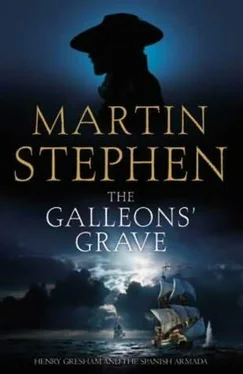Martin Stephen - The galleon's grave
Здесь есть возможность читать онлайн «Martin Stephen - The galleon's grave» весь текст электронной книги совершенно бесплатно (целиком полную версию без сокращений). В некоторых случаях можно слушать аудио, скачать через торрент в формате fb2 и присутствует краткое содержание. Жанр: Исторический детектив, на английском языке. Описание произведения, (предисловие) а так же отзывы посетителей доступны на портале библиотеки ЛибКат.
- Название:The galleon's grave
- Автор:
- Жанр:
- Год:неизвестен
- ISBN:нет данных
- Рейтинг книги:4 / 5. Голосов: 1
-
Избранное:Добавить в избранное
- Отзывы:
-
Ваша оценка:
- 80
- 1
- 2
- 3
- 4
- 5
The galleon's grave: краткое содержание, описание и аннотация
Предлагаем к чтению аннотацию, описание, краткое содержание или предисловие (зависит от того, что написал сам автор книги «The galleon's grave»). Если вы не нашли необходимую информацию о книге — напишите в комментариях, мы постараемся отыскать её.
The galleon's grave — читать онлайн бесплатно полную книгу (весь текст) целиком
Ниже представлен текст книги, разбитый по страницам. Система сохранения места последней прочитанной страницы, позволяет с удобством читать онлайн бесплатно книгу «The galleon's grave», без необходимости каждый раз заново искать на чём Вы остановились. Поставьте закладку, и сможете в любой момент перейти на страницу, на которой закончили чтение.
Интервал:
Закладка:
'Yes,' said Sidesmith, 'but the prophecy derives from others as well.'
'Its principles are Biblical as well as mathematical.' It was Balderstone again. His eyes were bright, and One could see something of the excitement that had drawn the students to him in droves when he had first taught at Cambridge. Who would have thought that an obscure prophecy could have aroused him so, thought Gresham. Not for the first time he reminded himself: never think you can completely know any human being. 'Muller and others — Melancthon, Stofler, Postel — argued that all human history is contained in a series of cycles.'
'These… cycles, are they Biblical?' It was the Dean of the College.
'Only in part,' Balderstone said. 'They are authenticated by the Holy Bible — passages in Revelations, Daniel XII and Isaiah — but their structure is numerical, based on permutations of the numbers seven and ten.'
A frisson of fear shuddered through the group. Numerology was accepted as a valid path of knowledge, but smacked to some of witchcraft.
'But what is the importance of all this?' It was the Master, part fascinated, part unsettled by Cecil's obvious displeasure.
Sidesmith glanced at Balderstone, who glanced back and shrugged.
'The prophecy of Regiomontanus is based on the belief that the penultimate cycle of human history closed in 1518 with Luther's defiance of the Pope,' said Sidesmith. There was shuffling in the crowd. Cambridge was fiercely Puritan, a Puritanism that had been made possible by Luther's defiance. Yet Gresham knew there were those in the Hall whose outward observance of Protestant ritual covered weekly attendance at the Mass, conducted in secret by priests whose bowels would be hung out to dry in front of them while their hearts were still beating if they were discovered.
'So are we all to die this year?' *No,' said Sidesmith.*Not this year. Next year. One version states that the final cycle is based on ten times seven years.'
'The time of the Babylonian captivity?' asked an excited young voice from die back, showing off.
'Precisely. It states that in 1588 the Seventh Seal will be broken.'
There was silence. From far away came the call of a servant in the kitchen.
'Some say that the anti-Christ will be overthrown in that year. That it will be the final judgement.'
For a moment the Hall seemed to darken. A cloud passing over the sun? Coincidence.
'What are the words or the prophecy?' It was another young student eagerly questioning.
Sidesmith did not raise his voice, but the sonorous words seemed to echo and reverberate in the Hall:
'"Post mille exactos a partu virginis annos
Et post quingentos rursus ab orbe datos
Octavagesimus octavus mirabilis annus
Ingruet et secum tristitia satis trahet.
Si non hoc anno totus malus occidet orbis,
Si non in totum terra fretumque ruant,
Cuncta tamen mundi sursum ibunt atque descrescent
Imperia et luctus undique grandis erit."'
For the Fellows, the Latin translated instantly in their minds. Gresham saw the confusion on the faces of some of the students, and cut in before they started to babble their ignorance to each other.
'"A thousand years from the virgin birth
Five hundred more allowed the globe,
Then is the wondrous eighty-eighth year
Bringing with it great woe. If, this year,
Total catastrophe does not befall, if land
And sea do not collapse in total ruin, yet
The whole world will suffer upheavals,
Empires will dwindle From everywhere
Will be great lamentation."'
This time the silence was longer. *Nonsense!' It was one of the most enfeebled of the Fellows, taken now to spluttering and declamation as the power of his mind left him. 'Superstitious nonsense, from those with brains in their backsides rather than in their heads. We shall not fight Spain if our soldiers and our sailors start in the belief that they are already dead.'
'Why, sir,' said Fat Tom, who claimed ancestry from Julius Caesar, and also claimed his ancestor's skill in military planning despite, never having been within shooting distance of an arquebus, 'I hardly feel we need to bring backsides into the debate. I person-ally always try to keep them out.'
The students laughed, as Tom had intended. Tom called everybody 'my dear' and spoke in a rather high voice from the top of his nose. He had once been challenged by a student who had called him a sodomite. Tom was a man who never willingly used one word where twenty would do. He had looked down on the boy, who could have been sent down for such an insult, and gave an answer that had immediately entered the folklore of the College. 'Young man,' he had said, 'I had to choose some years ago whether my pleasure was to come from food and drink or from sexual congress. My choice of the former makes the latter impractical, as I have trouble finding a bed to support me alone. At best, therefore, I can only be a sodomite in theory, and as you have shown a total inability to grasp any theory whatsoever, I would suggest that if such accusations are to be made then they should come from someone who does not have his brain up his arse.'
Tom's style and voice were deceptively languid. He spoke as if to the general mass. All knew he was talking to the man whose father was the government. 'If there is fear, it is only because men can see what government is blind to.'
'Your meaning, sir?' asked Cecil mildly. He had not pretended that the statement had been directed at anyone but him, but the neutrality of his response made him seem merely courteous and interested, rather than offended.
'There is confusion in our ranks, sir.' Tom was equally courteous. 'It's known that Spain is gathering ships. We have the greatest opposing army this side of antiquity a short sea journey away in the Netherlands, under Parma, the most powerful general in the world today.'
A mutter of agreement and fear went round the tables. Nowhere was dread of Spain stronger than in Puritan Cambridge. The Duke of Parma and his fierce Spanish soldiers were names used to frighten naughty children.
'There is… less confusion than you might conceive,' responded Cecil carefully, leaning forward. 'The Queen is eternally vigilant!'
'Why, so Her Majesty is,' said Fat Tom, 'but to us yokels out here in the country her generals appear less so. Where is the army that will repel the Duke of Parma? And with such soldiers as we have, where is the strategy? Are we to defend the whole coast, every port and harbour and beach, spread such men as we have around so thinly that they will report an invasion but be too weak to fight it off? Or do we concentrate our men at focal points to meet the attacker, risking that they land where we do not expect and march on London unopposed. Both tactics are risky, but it's even more risky to have no tactics at all!'
Tom was on the verge of rudeness, the distinction between that and academic robustness always being blurred. Cecil refused to rise to any bait.
'We have soldiers enough,' he said. God knows where they were, thought Gresham. England had never had a standing army, and the few professional soldiers it could muster were most of them in Flanders, failing to defeat the mighty Duke of Parma. 'But more than that we have our ships, surely? Ships enough to drop King Philip's lumbering galleons to the bottom of the sea, with or without Parma's precious soldiers in them.'
'The sea,' said Fat Tom, warming to his cause even more, 'is vast and even the most "lumbering'' of galleons is very small. Our fleet and theirs could pass each other in the night as if both were invisible.'
'And we have Drake…' said Cecil with an air of finality. There was a slight tick in his left eye, Gresham noted, an almost invisible flickering of the flesh. Drake. El Draco. Feared above all others by the Spaniards. Rumoured to have a magic glass through which he could see the position of every Spanish ship at sea. How else to explain the miraculous way he found the Spanish treasure vessels? A murmur of approval swept over the students. Drake was a talisman, a magic symbol to wave away fear of invasion. 'Drake is a mighty figure indeed. And captaining, of course, one of our new fine ships. Ships that can dip and weave across the waves like a dancer, sailing almost into the wind…'
Читать дальшеИнтервал:
Закладка:
Похожие книги на «The galleon's grave»
Представляем Вашему вниманию похожие книги на «The galleon's grave» списком для выбора. Мы отобрали схожую по названию и смыслу литературу в надежде предоставить читателям больше вариантов отыскать новые, интересные, ещё непрочитанные произведения.
Обсуждение, отзывы о книге «The galleon's grave» и просто собственные мнения читателей. Оставьте ваши комментарии, напишите, что Вы думаете о произведении, его смысле или главных героях. Укажите что конкретно понравилось, а что нет, и почему Вы так считаете.












